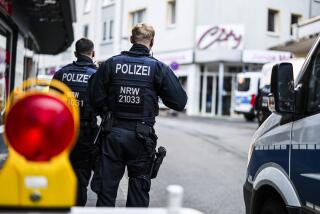German Official Quits Amid Shootout Furor
- Share via
BERLIN — German Interior Minister Rudolf Seiters resigned Sunday, saying he accepts political responsibility for a growing scandal over the circumstances surrounding a shootout a week ago in northern Germany.
The gun battle, between a crack government security unit and two suspected members of the Red Army Faction terrorist organization, left one suspect and one member of the security force dead and generated a string of embarrassing, unanswered questions.
“It is right that in Germany the term ‘political responsibility’ exists,” Seiters, 55, said in a brief statement to reporters in Bonn. “Who should accept this responsibility, if not a Cabinet minister?”
While not directly involved in the deployment of Germany’s anti-terrorist unit, known as GSG-9, Seiters said he decided to resign because “apparent mistakes, shortcomings and a failure of coordination between federal authorities have become clear in connection with (the incident).”
Seiters’ departure made him the ninth Cabinet minister to leave Chancellor Helmut Kohl’s government in 16 months and the sixth to go under a cloud of controversy.
Kohl reportedly tried to talk Seiters out of stepping down during a meeting Sunday. A successor was not immediately named.
A seemingly endless series of contradictory official explanations has followed the June 27 shootout at a railroad station in the small resort town of Bad Kleinen, about 60 miles east of Hamburg.
The GSG-9 unit surprised suspected terrorists Wolfgang Grams, 40, and Birgit Hogefeld, 36, as they left the station’s restaurant. Amid the gunfire that followed, Grams and one member of the anti-terrorist group, Michael Newrzella, 25, died.
Initially, officials said the two men were killed during the exchange of fire, but subsequent comments by witnesses and conflicting official statements on the encounter have heightened public suspicion.
The Federal Office of Criminal Affairs has scheduled a news conference for today in the latest attempt to clarify events.
Some of those familiar with the incident maintain that Newrzella died from a ricocheting bullet fired by one of his own colleagues and that Grams had been captured and disarmed before he was shot.
The weekly news magazine Der Spiegel, in its issue published today, quotes an unidentified member of the anti-terrorist unit as saying, “The killing of Mr. Grams was comparable to an execution.”
Grams was wanted in connection with assassinations of prominent West German businessmen in the 1980s.
Hogefeld, who survived the shootout and is now in custody, is suspected of being involved in the 1988 attempted assassination of Hans Tietmeyer, a former state secretary in the Finance Ministry.
More to Read
Sign up for Essential California
The most important California stories and recommendations in your inbox every morning.
You may occasionally receive promotional content from the Los Angeles Times.










